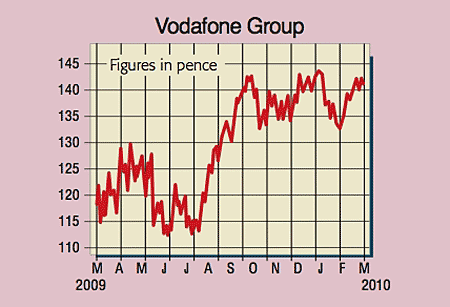
Wealth preservation is the number one priority for 2010. But with cash returns negative (after inflation), just as property, bond and equity markets face huge challenges, how can an investor achieve it? One relatively safe option is Vodafone, the world’s largest mobile provider.
Offering a chunky 5.3% dividend yield, the firm should be resilient during the harsher climate ahead. Indeed, although it’s been a perennial underachiever, the chief executive, Vittorio Colao, is beginning to turn things around. Over the past 18 months he has been focusing on cash generation, cost reduction and speed of execution. In February, the firm reported higher profits and a 10.3 million rise in its user base to 333 million customers. Since then the group has launched the immensely popular iPhone in 14 countries, and shifted in excess of 100,000 devices in Britain alone. Data-hungry smartphones now account for a quarter of all mobiles sold worldwide.
The marriage of Orange and T-Mobile will also be good news for Vodafone’s UK operation. This sort of industry consolidation is likely to deliver less churn and greater profits per user. Better still, by owning the fastest domestic 3G network, especially in hot spots such as central London, Vodafone is ideally placed to exploit the exponential growth in mobile connectivity. In fact, this could be a major weapon in the fight to regain the upper hand if subscribers begin choosing operators based on network quality as opposed to just price.
Vodafone (LSE: VOD), rated a BUY by Deutsche Bank
Nevertheless, there is a strategic headache to be addressed – what to do with the firm’s 44% stake in SFR (worth around €6bn) and 45% stake in Verizon Wireless (worth approx £35bn). Both holdings tie up lots of capital and neither yet pays a dividend. However, there is light at the end of the tunnel. VW’s cash flow is currently being used to repay inter-company debt (about $8bn) to Verizon Communications (VZ). But this process should be completed by 2011, at which point the dividend may be reinstated. Moreover, Vivendi, which owns the other 56% of SFR, has already indicated it is willing to buy Vodafone’s holding.
The City is forecasting 2010 sales and underlying earnings per share of £43.8bn and 15.5p respectively. This puts the stock on a miserly price/earnings ratio of 9.5. With 85% of revenues derived from overseas and nearly a third from emerging markets, Vodafone offers a compelling blend of income, protection against a weak pound and utility-like defensive qualities. So I would value the group on six-times earnings before interest tax, depreciation and amortisation (Ebitda). After adjusting for the £31.7bn in net debt, I get a fair value of about 180p per share.
What could go wrong? If there is another economic wobble, mobile services will suffer. The balance sheet also needs to be watched, with a net debt to Ebitda ratio at a hefty 2.2. There are also threats from disruptive technologies such as Wi-Fi, WiMAX and VoIP (‘voice over the internet’) – all could damage Ebitda margins of 33%. Over-zealous regulators could hurt profits, and the firm is further exposed to foreign-currency fluctuations. But these concerns are more than factored into the depressed price. Deutsche has a 190p price target.
Recommendation: BUY at 148p